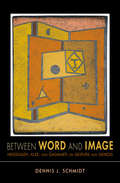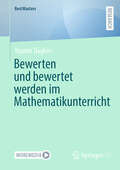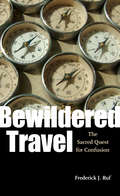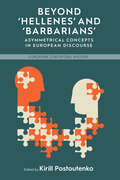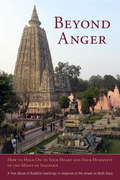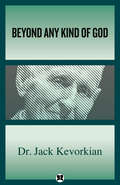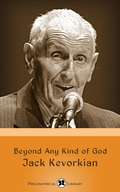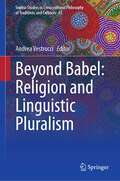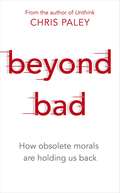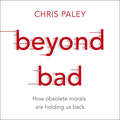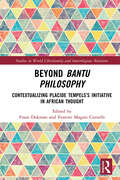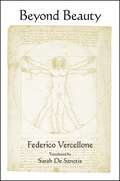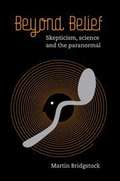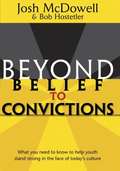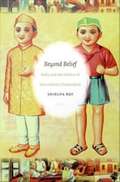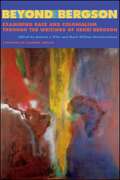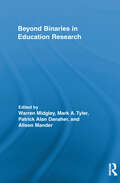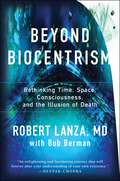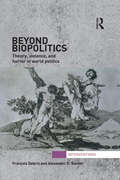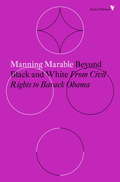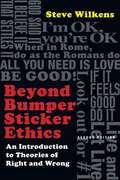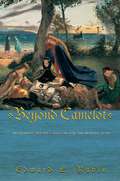- Table View
- List View
Between Word and Image: Heidegger, Klee, and Gadamer on Gesture and Genesis (Studies in Continental Thought)
by Dennis J. SchmidtA groundbreaking examination of word and image through the lenses of modern art and Continental philosophy: &“Probing and lucid&” (Stephen H. Watson, University of Notre Dame). Engagement with the image has played a decisive role in the formulation of the very idea of philosophy since Plato. Identifying pivotal moments in the history of philosophy, Dennis J. Schmidt develops the question of philosophy&’s regard of the image by considering painting―where the image most clearly calls attention to itself as an image. Focusing on the philosophies of Martin Heidegger and Hans-Georg Gadamer and the art of Paul Klee, Schmidt pursues larger issues in the relationship between word, image, and truth. As he investigates alternative ways of thinking about truth through word and image, Schmidt shows how the form of art can indeed possess the capacity to change its viewers.
Bewerten und bewertet werden im Mathematikunterricht (BestMasters)
by Yasmin DagherBewertungen im Unterricht können mithilfe verbaler und nonverbaler Kommunikationsmittel erfolgen. Dabei lassen sie sich als feine Mechanismen beschreiben, die Einschätzungen von Leistung mitbestimmen können. Schüler*innen können sie außerdem Aufschluss darüber geben, welche Anforderungen in Bezug auf Verhalten oder Unterrichtsbeiträge an sie gestellt werden. Die vorliegende qualitative Forschungsarbeit bietet einen Einblick in die Bewertungspraxis im Mathematikunterricht. Dabei wird aufgezeigt, wie Bewertungen erfolgen und insbesondere, wie diese von Schüler*innen wahrgenommen werden. Mit der Durchführung von Gruppendiskussionen wird ein Zugang zu den Wahrnehmungen von Schüler*innen ermöglicht und ihre Perspektive auf Bewertungssituationen analysiert und dargestellt.
Bewildered Travel: The Sacred Quest for Confusion (Studies in Religion and Culture)
by Frederick J. RufWhy do we travel? Ostensibly an act of leisure, travel finds us thrusting ourselves into jets flying miles above the earth, only to endure dislocations of time and space, foods and languages foreign to our body and mind, and encounters with strangers on whom we must suddenly depend. Travel is not merely a break from routine; it is its antithesis, a voluntary trading in of the security one feels at home for unpredictability and confusion. In Bewildered Travel Frederick Ruf argues that this confusion, which we might think of simply as a necessary evil, is in fact the very thing we are seeking when we leave home.Ruf relates this quest for confusion to our religious behavior. Citing William James, who defined the religious as what enables us to "front life," Ruf contends that the search for bewilderment allows us to point our craft into the wind and sail headlong into the storm rather than flee from it. This view challenges the Eliadean tradition that stresses religious ritual as a shield against the world's chaos. Ruf sees our departures from the familiar as a crucial component in a spiritual life, reminding us of the central role of pilgrimage in religion. In addition to his own revealing experiences as a traveler, Ruf presents the reader with the journeys of a large and diverse assortment of notable Americans, including Henry Miller, Paul Bowles, Mark Twain, Mary Oliver, and Walt Whitman. These accounts take us from the Middle East to the Philippines, India to Nicaragua, Mexico to Morocco--and, in one threatening instance, simply to the edge of the author's own neighborhood. "What gives value to travel is fear," wrote Camus. This book illustrates the truth of that statement.
Beyond 'Hellenes' and 'Barbarians': Asymmetrical Concepts in European Discourse (European Conceptual History #8)
by Kirill PostoutenkoForty years ago, German historian Reinhart Koselleck coined the notion of ‘asymmetrical concepts’, pointing at the asymmetry between standard self-ascriptions, such as ‘Hellenes’ or ‘Christians’, and pejorative other-references (‘Barbarians’ or ‘Pagans’) as a powerful weapon of cultural and political domination. Advancing and refining Koselleck’s approach, Beyond ‘Hellenes’ and ‘Barbarians’ explores the use of significant conceptual asymmetries such as ‘civilization’ vs. ‘barbarity’, ‘liberalism’ vs. ‘servility’, ‘order’ vs. ‘chaos’ or even ‘masters’ vs. ‘slaves’ in political, scientific and fictional discourses of Europe from the Middle Ages to the present day. Using an interdisciplinary set of approaches, the scholars in political history, cultural sociology, intellectual history and literary criticism bolster and extend our understanding of this ever-growing area of conceptual history.
Beyond Anger: How to Hold On to Your Heart and Your Humanity in the Midst of Injustice
by Shambhala PublicationsIn July 2013, multiple bombs exploded in Bodh Gaya, India, in and around the holiest Buddhist pilgrimage site, the Mahabodhi temple that marks the spot where the Buddha attained enlightenment. In response, Shambhala Publications offers this free eBook consisting of excerpts from some of our books from a variety of Buddhist traditions that encapsulate values of love and nonviolence, which we can all practice ourselves. A chapter from the Karmapa points out the toxicity and uselessness of anger, from a basic, interpersonal level to the wider society at large. In "I Take Up the Way of Letting Go of Anger," Zen teacher Diane Eshin Rizzetto helps us look at how we relate to an emotion like anger and, rather than suppress it, she marks a clear pathway we can follow to awaken in its presence and not let it incite us to negative thoughts and actions. Jack Kornfield talks about how to succeed in bringing mindfulness and loving-kindness into arenas like politics and war zones. And a short selection from the chapter on patience in the Mahayana classic The Way of the Bodhisattva highlights that the real enemy is anger itself, not something or someone external.
Beyond Any Kind of God
by Dr Jack KevorkianWho has not at least once in his lifetime asked himself, "What is this thing called 'life'?" "What does it mean to 'be'?" "How and why do we 'live'?" "What is this great and sinister unknown, 'death'?" An instant of meditative stargazing may prompt any of these questions. The purpose of this work is very broad and ambitious. Any effort aimed at trying to peer into the Great Unknown, the far-bidding realm of transcendentalism (if it exists), is bound to be fraught with "absurdities" and "improbabilities," to be "fantastic" here and there, to be "ridiculous" as a whole. This book could be all that, and more, if it were offered as more than an attempt to merely exemplify what the basic concepts may or possibly could entail and to develop a philosophic view as timeless, as fundamentally unchangeable, as the universe with which it deals. As a logical beginning the author takes a close look at "existence" followed by "life," which cannot be independent of it and with which it is really inextricably alloyed. As it ends things for us on earth, so too will "death" end this discourse. The knell will be not so much a dirge as it will be a harmonious synthesis of a grand unity--the undissectible fusion of death, life, and existence into an inscrutable scheme that might be cogent and imposing enough to cause one to look beyond his idols and icons for the essence of his being and his non-being.
Beyond Any Kind of God
by Dr. Jack KevorkianThe controversial doctor and advocate of assisted suicide presents a philosophical inquiry into the nature of life and death. What is this thing called &“life&”? What does it mean to &“be&”? How and why do we &“live&”? What is this great and sinister unknown, &“death&”? These are timeless and universal questions. They are the type of questions prompted by meditative stargazing, and the sort we too often avoid in our modern world. In this ambitious and contemplative work, Jack Kevorkian examines these Great Questions anew. Known in the media as Dr. Death, Kevorkian is perhaps the world&’s most prominent euthanasia activist. Believing terminally ill patients have the right to pursue physician-assisted suicide, he personally aided doctors in more than one hundred such procedures. Rather than offering a scientific or philosophical treatise, Beyond Any Kind of God is Kevorkian&’s personal, mental meandering into the very hazy phenomena that constitute the basis for human life.
Beyond Any Kind of God
by Jack KevorkianAlmost lost to obscurity before now, Beyond Any Kind of God gives readers a glimpse into the philosophical views of the most controversial physician of our time. Written after his life-changing voyages abroad, Kevorkian’s only philosophical book provides a compelling study of the doctor’s early views on the meaning of life, solipsism, and death. Jack (Jacob) Kevorkian was infamous in his later life for his support of doctor-assisted suicide, for which he was incarcerated for eight years. Kevorkian was a multi-talented physician, philosopher, musician, and artist, and he wrote several books and countless articles on topics ranging from medical to philosophical to political. He was a firm believer in the “right to die,” and his views made him one of the most controversial figures of recent American history. Born in Pontiac, Michigan, in 1928 to Armenian-immigrant parents, Kevorkian showed an early interest in languages and medicine. He graduated from University of Michigan Medical School in 1952, and entered the Army, later serving in the Korean War. Upon leaving the Army, Kevorkian traveled extensively, and out of these travels came the inspiration for much of his early literature, including Beyond Any Kind of God. As a pathologist, Kevorkian researched unique procedures, and he became interested in end-of-life planning and care. In 1999, he was convicted for helping over one hundred patients end their lives, and he was incarcerated for eight years. Upon release, he toured the country and continued his campaign for a patient’s right to make end-of-life decisions until his death in 2011.
Beyond Autonomy in Eighteenth-Century British and German Aesthetics (Routledge Studies in Eighteenth-Century Philosophy)
by Karl AxelssonThis volume re-examines traditional interpretations of the rise of modern aesthetics in eighteenth-century Britain and Germany. It provides a new account that connects aesthetic experience with morality, science, and political society. In doing so, it challenges long-standing teleological narratives that emphasize disinterestedness and the separation of aesthetics from moral, cognitive, and political interests. The chapters are divided into three thematic parts. The chapters in Part I demonstrate the heteronomy of eighteenth-century British aesthetics. They chart the evolution of aesthetic concepts and discuss the ethical and political significance of the aesthetic theories of several key figures: namely, the third Earl of Shaftesbury, David Hume, and Adam Smith. Part II explores the ways in which eighteenth-century German, and German-oriented, thinkers examine aesthetic experience and moral concerns, and relate to the work of their British counterparts. The chapters here cover the work of Kant, Moses Mendelssohn, Alexander Gottlieb Baumgarten, and Madame de Staël. Finally, Part III explores the interrelation of science, aesthetics, and a new model of society in the work of Goethe, Johann Wilhelm Ritter, Friedrich Hölderlin, and William Hazlitt, among others. This volume develops unique discussions of the rise of aesthetic autonomy in the eighteenth century. In bringing together well-known scholars working on British and German eighteenth-century aesthetics, philosophy, and literature, it will appeal to scholars and advanced students in a range of disciplines who are interested in this topic.
Beyond Babel: Religion and Linguistic Pluralism (Sophia Studies in Cross-cultural Philosophy of Traditions and Cultures #43)
by Andrea VestrucciThis volume is the first attempt to investigate explicitly how the multiplicity of religions and forms of spirituality interconnect with the pluralism of languages, including scientific codes, formal languages, and artistic expressions. In a journey “beyond Babel”, the volume explores how religious and linguistic pluralisms enter into polyphonic relations, how they co-evolve and grow together, and why they clash. This text provides the setting for a dialogue on a rich variety of religious languages and traditions, including Hinduism, Judaism, Islam, Jainism, and Christianity. The chapters explore how these traditions can venture into new interreligious paths, how sacred meanings translate into vernacular speeches, how religious identities and scientific notions interacts, what role emotional expressions play in interfaith encounters, and the impact of Artificial Intelligence on beliefs.The book is authored by esteemed senior scholars, established researchers, and exceptional junior doctorate holders whose expertise spans across religious studies, the history of science, philosophy, fine arts, theology, linguistics, computer science, and legal studies. This volume contributes to interfaith studies and teaching, to sociology and philosophy of religion, and to the history and anthropology of religion and the sacred arts. It is intended to reach students, researchers, instructors, and professionals alike.
Beyond Bad: How obsolete morals are holding us back
by Chris Paley'Brilliantly unillusioned thinking... It could hardly be more necessary in these all-too-moralistic times' - James Marriott, THE TIMESMorals have held empires together, kept soldiers marching under fire, fed the hungry, passed laws, built walls, welcomed immigrants, destroyed careers and governed our sex lives. But what if morality's all meaningless rubbish, a malfunctioning relic of our evolutionary past? This is the provocative argument that Chris Paley makes. This isn't an attack on one set of moral codes or one way of thinking about ethics: it's a call for abolishing the whole caboodle.He uses evolutionary psychology to show how and why morality emerged: theyenabled our forebears to survive and prosper in tribal groups. Today, our morals constrain us, bias us, and push us in the wrong direction. The biggest challenges our species faces, whether global warming, nuclear proliferation or the rise of the robots, are pan-human. These challenges are beyond what our moral minds were designed to cope with. You can't build smartphones with stone-age axes, and you can't solve modern humanity's problems with tools that are designed to create primitive, competitive groups.From Chris Paley, author of the 'extraordinary', 'startling' and 'thought-provoking' Unthink, comes Beyond Bad, which shows morals hinder us from achieving what we want to achieve. Beyond Bad is the book that 'does for morals what Dawkins did for God'.
Beyond Bad: How obsolete morals are holding us back
by Chris Paley'Truly thought-provoking. Paley puts forth an astonishingly original hypothesis and defends it eloquently, marshalling cutting-edge science to argue against the very idea of morality.'Kurt Gray, Associate Professor, University of North Carolina, Chapel Hill'There is a serious challenge here to received ways of thinking for the lay public and professional moral philosophers alike.' John P Burgess, John N Woodhull Professor of Philosophy, Princeton UniversityMorals have held empires together, kept soldiers marching under fire, fed the hungry, passed laws, built walls, welcomed immigrants, destroyed careers and governed our sex lives. But what if morality's all meaningless rubbish, a malfunctioning relic of our evolutionary past? This is the provocative argument that Chris makes. This isn't an attack on one set of moral codes or one way of thinking about ethics: it's a call for abolishing the whole caboodle.He uses evolutionary psychology to show how and why morality emerged: theyenabled our forebears to survive and prosper in tribal groups. Today, our morals constrain us, bias us, and push us in the wrong direction. The biggest challenges our species faces, whether global warming, nuclear proliferation or the rise of the robots, are pan-human. These challenges are beyond what our moral minds were designed to cope with. You can't build smartphones with stone-age axes, and you can't solve modern humanity's problems with tools that are designed to create primitive, competitive groups.From Chris Paley, author of the 'extraordinary', 'startling' and 'thought-provoking' Unthink, comes Beyond Bad, which shows morals hinder us from achieving what we want to achieve. Beyond Bad is the book that 'does for morals what Dawkins did for God'.
Beyond Bad: How obsolete morals are holding us back
by Chris Paley'Brilliantly unillusioned thinking... It could hardly be more necessary in these all-too-moralistic times' - James Marriott, THE TIMES'There is a serious challenge here to received ways of thinking for the lay public and professional moral philosophers alike.' John P Burgess, John N Woodhull Professor of Philosophy, Princeton UniversityScientific research has achieved what thousands of years of philosophising failed to do: explain why we have morals and how they work. The answers are surprising and frequently disturbing.Morals have held empires together, kept soldiers marching under fire, fed the hungry, passed laws, built walls, welcomed immigrants, destroyed careers and governed our sex lives. But what if morality's all meaningless rubbish, a malfunctioning relic of our evolutionary past?This is the provocative argument that Chris makes. This isn't an attack on one set of moral codes or one way of thinking about ethics: it's a call for abolishing the whole caboodle.He uses evolutionary psychology to show how and why morality emerged: they enabled our forebears to survive and prosper in tribal groups. Today, our morals constrain us, bias us, and push us in the wrong direction.The biggest challenges our species faces, whether global warming, nuclear proliferation or the rise of the robots, are pan-human. These challenges are beyond what our moral minds were designed to cope with. You can't build smartphones with stone-age axes, and you can't solve modern humanity's problems with tools that are designed to create primitive, competitive groups.From Chris Paley, author of the 'extraordinary', 'startling' and 'thought-provoking' Unthink, comes Beyond Bad, which shows morals hinder us from achieving what we want to achieve. Beyond Bad is the book that 'does for morals what Dawkins did for God'. (P) 2021 Hodder & Stoughton Ltd
Beyond Bantu Philosophy: Contextualizing Placide Tempels’s Initiative in African Thought (Studies in World Christianity and Interreligious Relations)
by Frans DokmanFranciscan priest Placide Tempels’s 1946 book, Bantu Philosophy, introduced a new discourse about African thought and beliefs, questioning the universality of Western philosophy and establishing paradigms that continue to dominate discussion of the relationships between Africa and the West today. More than 75 years after the publication of this influential text, this volume brings together a wide range of contributors to examine the legacy and impact of Tempels’s work for the study of African philosophy and religion. Reflecting on whether Bantu Philosophy reinforces conflict or convergence between Africa and the West, and its reception within Africa, scholars from both African and Western institutions provide new perspectives on both Tempels’s ideas and ongoing debates in African philosophy and religion.
Beyond Beauty (SUNY series in Contemporary Italian Philosophy)
by Federico VercelloneThe American abstract expressionist painter Barnett Newman famously declared in 1948 that the impulse of modern art is to destroy beauty. Not long after that, Andy Warhol was reconciling the world of art with the world of everyday life, painting soup cans and soda bottles. In this book, Federico Vercellone provides an account of the decline of beauty as a Platonic ideal from early German Romanticism to the twentieth century. He traces this intellectual trajectory from Goethe, Dilthey, and Nietzsche, through modernism and the avant-garde move ment, to the work of Adorno and Heidegger. Rather than the death or destruction of beauty, Vercellone argues instead that beauty in the twentieth century came back to live in reality and everyday life. He suggests this is a new edition of the classical ideal rather than an abandonment of it, and further makes the case for the ecological significance of this orientation and outlook.
Beyond Belief
by Martin BridgstockWhether ghosts, astrology or ESP, up to 80 per cent of the population believes in one or more aspects of the paranormal. Such beliefs are entertaining, and it is tempting to think of them as harmless. However, there is mounting evidence that paranormal beliefs can be dangerous - cases of children dying because parents rejected orthodox medicine in favour of alternative remedies, and 'psychics' who trade on the grief of the bereaved for personal profit and gain. Expenditure on the paranormal runs into billions of dollars each year. In Beyond Belief: Skepticism, Science and the Paranormal Martin Bridgstock provides an integrated understanding of what an evidence-based approach to the paranormal - a skeptical approach - involves, and why it is necessary. Bridgstock does not set out to show that all paranormal claims are necessarily false, but he does suggest that we all need the analytical ability and critical thinking skills to seek and assess the evidence for paranormal claims.
Beyond Belief to Conviction
by Josh Mcdowell Bob HostetlerThis book is a challenge to teens to live out the truth of their faith.
Beyond Belief: India and the Politics of Postcolonial Nationalism
by Srirupa RoyBeyond Belief is a bold rethinking of the formation and consolidation of nation-state ideologies. Analyzing India during the first two decades following its foundation as a sovereign nation-state in 1947, Srirupa Roy explores how nationalists are turned into nationals, subjects into citizens, and the colonial state into a sovereign nation-state. Roy argues that the postcolonial nation-state is consolidated not, as many have asserted, by efforts to imagine a shared cultural community, but rather by the production of a recognizable and authoritative identity for the state. This project--of making the state the entity identified as the nation's authoritative representative--emphasizes the natural cultural diversity of the nation and upholds the state as the sole unifier or manager of the "naturally" fragmented nation; the state is unified through diversity. Roy considers several different ways that identification with the Indian nation-state was produced and consolidated during the 1950s and 1960s. She looks at how the Films Division of India, a state-owned documentary and newsreel production agency, allowed national audiences to "see the state"; how the "unity in diversity" formation of nationhood was reinforced in commemorations of India's annual Republic Day; and how the government produced a policy discourse claiming that scientific development was the ultimate national need and the most pressing priority for the state to address. She also analyzes the fate of the steel towns--industrial townships built to house the workers of nationalized steel plants--which were upheld as the exemplary national spaces of the new India. By prioritizing the role of actual manifestations of and encounters with the state, Roy moves beyond theories of nationalism and state formation based on collective belief.
Beyond Bergson: Examining Race and Colonialism through the Writings of Henri Bergson (SUNY series, Philosophy and Race)
by Andrea J. Pitts; Mark William Westmoreland; Leonard LawlorBuilding upon recent interest in Henri Bergson's social and political philosophy, this volume offers a series of fresh and novel perspectives on Bergson's writings through the lenses of critical philosophy of race and decolonial theory. Contributors place Bergson's work in conversation with theorists from Africa, the African Diaspora, and Latin America to examine Bergson's influence on literature, science studies, aesthetics, metaphysics, and social and political philosophy within these geopolitical contexts. The volume pays particular attention to both theoretical and practical forms of critical resistance work, including historical analyses of anti-racist, anti-imperialist, and anti-capitalist movements that have engaged with Bergson's writings—for example, the Négritude movement, the Indigenismo movement, and the Peruvian Socialist Party. These historical and theoretical intersections provide a timely and innovative contribution to the existing scholarship on Bergson, and demonstrate the importance of his thought for contemporary social and political issues.
Beyond Binaries in Education Research (Routledge Research in Education)
by Patrick Alan Danaher Warren Midgley Mark A. Tyler Alison ManderBeyond Binaries in Education Research explores the ethical, methodological, and social justice issues relating to conceptualizations of binary opposites in education research, particularly where one side of the dualism is perceived to be positive and the other negative. In education research these may include ability-disability, academic-vocational, adult-child, formal-informal learning, male-female, research-practice, researcher-participant, sedentary-mobile, and West-East. Chapters in this book explore the resilience of binary constructions and present conceptual models for moving beyond them and/or reconceptualizing them to facilitate more productive approaches to education provision. With contributors from authors working in a multitude of educational fields and countries, this book provides a significant contribution to the ongoing challenge to seek new ways to move beyond binaries in education research.
Beyond Biocentrism: Rethinking Time, Space, Consciousness, and the Illusion of Death
by Bob Berman Robert LanzaBiocentrism shocked the world with a radical rethinking of the nature of reality. But that was just the beginning. In Beyond Biocentrism, acclaimed biologist Robert Lanza, one of TIME Magazine's "100 Most Influential People in 2014," and leading astronomer Bob Berman, take the reader on an intellectual thrill-ride as they re-examine everything we thought we knew about life, death, the universe, and the nature of reality itself. The first step is acknowledging that our existing model of reality is looking increasingly creaky in the face of recent scientific discoveries. Science tells us with some precision that the universe is 26.8 percent dark matter, 68.3 percent dark energy, and only 4.9 percent ordinary matter, but must confess that it doesn't really know what dark matter is and knows even less about dark energy. Science is increasingly pointing toward an infinite universe but has no ability to explain what that really means. Concepts such as time, space, and even causality are increasingly being demonstrated as meaningless. All of science is based on information passing through our consciousness but science hasn't the foggiest idea what consciousness is, and it can't explain the linkage between subatomic states and observation by conscious observers. Science describes life as a random occurrence in a dead universe but has no real understanding of how life began or why the universe appears to be exquisitely designed for the emergence of life. The biocentrism theory isn't a rejection of science. Quite the opposite. Biocentrism challenges us to fully accept the implications of the latest scientific findings in fields ranging from plant biology and cosmology to quantum entanglement and consciousness. By listening to what the science is telling us, it becomes increasingly clear that life and consciousness are fundamental to any true understanding of the universe. This forces a fundamental rethinking of everything we thought we knew about life, death, and our place in the universe.
Beyond Biopolitics: Theory, Violence, and Horror in World Politics (Interventions)
by Francois Debrix Alexander D Barder'Beyond Biopolitics constitutes a truly serious attempt to think about the unthinkable.' Guy Lancaster, Political Studies Review: 2014 VOL 12, 93. Beyond Biopolitics exposes the conceptual limits of critical biopolitical approaches to violence, war, and terror in the post-9/11-War on Terror era. This volume shows that such popular international political theories rely upon frames of representation that leave out of focus a series of extreme forms of gruesome violence that have no concern for the preservation of life, a crucial biopolitical theme. Debrix and Barder mobilize different concepts—horror, agonal sovereignty, the pulverization of the flesh, or the notion of an inhumanity-to-come—to shed light on past and present ghastly scenes and events of violence that seek to undo the very idea of humanity. To highlight the capacity of horror to be in excess of both violence and the meaning of humanity, Beyond Biopolitics provides a series of engagements with issues much debated in contemporary critical theoretical circles, in particular war and terror, the production of fear, states and spaces of exception, and alterity as enmity. This work will be of great interest to scholars of critical international relations theory, critical security studies and international relations.
Beyond Black and White: From Civil Rights to Barack Obama
by Manning MarableHighly acclaimed dissection of the "new racism," from one of the greatest radical black intellectuals of our timeMany in the US, including Barack Obama, have called for a 'post-racial' politics: yet race still divides the country politically, economically and socially. In this highly acclaimed work, Manning Marable rejects both liberal inclusionist strategies and the separatist politics of the likes of Louis Farrakhan. Beginning by looking back at African-American politics and the fight against racism of the recent past, outlining a trenchant analysis of the 'New Racial Domain' that must be uprooted, he argues powerfully for a 'transformationist' strategy, which retains a distinctive black cultural identity but draws together all the poor and exploited in a united struggle against oppression.From the Trade Paperback edition.
Beyond Bumper Sticker Ethics: An Introduction to Theories of Right and Wrong
by Steve WilkensIdeas have consequences. And sometimes those ideas can be squeezed into slogans, slapped on bumper stickers and tweeted into cyberspace. These compact messages coming at us from all directions often compress in a few words entire ethical systems. It turns out that there's a lot more to the ideas behind these slogans--ideas that need to be sorted out before we make important moral decisions as individuals or as societies. In this revised and expanded edition of Steve Wilkens's widely-used text, the author has updated his introductions to basic ethical systems:cultural relativismethical egoismutilitarianismbehaviorismsituation ethicsKantian ethicsvirtue ethicsnatural law ethicsdivine command theoryHe has also added two new chapters:evolutionary ethicsnarrative ethicsWith clarity and wit Wilkens unpacks the complicated ideas behind the slogans and offers Christian evaluations of each.
Beyond Camelot: Rethinking Politics and Law for the Modern State
by Edward L. RubinThis book argues that many of the basic concepts that we use to describe and analyze our governmental system are out of date. Developed in large part during the Middle Ages, they fail to confront the administrative character of modern government. These concepts, which include power, discretion, democracy, legitimacy, law, rights, and property, bear the indelible imprint of this bygone era's attitudes, and Arthurian fantasies, about governance. As a result, they fail to provide us with the tools we need to understand, critique, and improve the government we actually possess. Beyond Camelot explains the causes and character of this failure, and then proposes a new conceptual framework, drawn from management science and engineering, which describes our administrative government more accurately, and identifies its weaknesses instead of merely bemoaning its modernity. This book's proposed framework envisions government as a network of connected units that are authorized by superior units and that supervise subordinate ones. Instead of using inherited, emotion-laden concepts like democracy and legitimacy to describe the relationship between these units and private citizens, it directs attention to the particular interactions between these units and the citizenry, and to the mechanisms by which government obtains its citizens' compliance. Instead of speaking about law and legal rights, it proposes that we address the way that the modern state formulates policy and secures its implementation. Instead of perpetuating outdated ideas that we no longer really believe about the sanctity of private property, it suggests that we focus on the way that resources are allocated in order to establish markets as our means of regulation. Highly readable, Beyond Camelot offers an insightful and provocative discussion of how we must transform our understanding of government to keep pace with the transformation that government itself has undergone.
